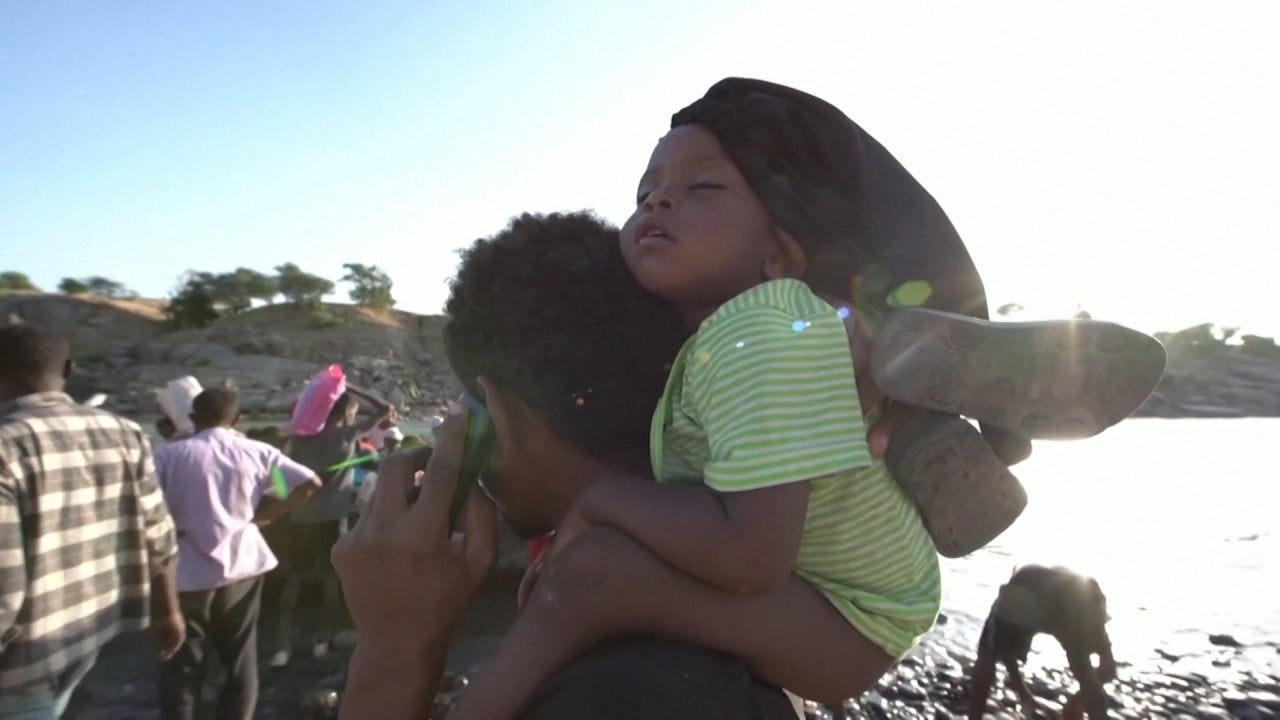
China hits out at sanctions on new African belt and road partner Eritrea as it focuses on ports
- The US and some European countries have punished Eritrea for its involvement in the war in Ethiopia’s Tigray region
- The tiny nation is strategically important to China’s attempts to expand its trade, given its proximity to Red Sea, Suez Canal and Europe
A joint statement by Wang and his counterpart Osman Saleh said both sides “oppose hegemonic interference in the internal affairs of other countries under the pretext of democracy and human rights”. It added: “The Chinese side stands against any unilateral sanctions on Eritrea. The Eritrean side reaffirms adherence to the one-China principle.”
The US in November imposed sanctions on the Eritrean military, whose soldiers fought in the Tigray region alongside Ethiopian forces against the Tigray People’s Liberation Front rebel group.
While meeting Isaias on Wednesday in Asmara, the capital, Wang announced that China would provide 100 million yuan (US$15.7 million) as additional support for Eritrea as the Horn of Africa nation welcomed China to invest in its mining, infrastructure and Massawa and Assab port developments.
With a three-nation African tour that also includes Kenya and the Comoros, Wang is keeping up a Chinese tradition since 1991 by making the continent the foreign minister’s first overseas visit of the year. It is Wang’s second trip to the continent in just over a month, after he co-chaired the Forum on China-Africa Cooperation in Senegal in late November.
Wang conveyed a message from President Xi Jinping to Eritrean counterpart Isaias inviting him to visit China for extensive talks on their strategic partnership, according to Eritrean Information Minister Yemane Meskel.
China opposes UN probe of Tigray abuse, calls it ‘interference’
The African nation has for years been cut off from the rest of the world. But it has a key asset: its access to the Red Sea, the Suez Canal and Europe, making it extremely important to the belt and road.
In November, Eritrea became the latest African nation to join the belt and road, a multibillion-dollar initiative that has helped build infrastructure megaprojects across Africa, including ports, power dams, railways and roads.
John Calabrese, head of the Middle East-Asia Project at American University in Washington, said: “Eritrea has access to the sea. Maritime access is key to the belt and road’s success in that part of the world.”
China is making inroads into the Horn of Africa and has invested heavily in Djibouti’s maritime sector via the country’s ports and free-trade zones. It has also built its first overseas military base there, near the Bab el-Mandeb passageway between the Gulf of Aden and the Red Sea.

Beijing has deepened its footprint in Ethiopia, especially in funding construction of the Addis Ababa-Djibouti railway, but the Tigray war has threatened its investments.
Besides increasing its investments in Eritrea, whose army has been accused of involvement in the war, Beijing is seeking its government’s help to end the conflict. Thousands of people have been killed and more than 2 million displaced in a war that has lasted for more than a year.
Calabrese said that finding ways to end the war was one of the objectives of Wang’s trip. “After all, Beijing has poured a lot of time, effort and money into Ethiopia in recent years, which the ongoing conflict places at risk,” he said.
He said a long-standing connection between China and Eritrea could give Beijing leverage there.
“China provided arms to Eritrea during the 30-year war for independence [that ended in 1991],” Calabrese said. “There’s also an opportunity: a one-party state with an abysmal human rights record and fragile economy that the West has regarded as a pariah state and thus ignored.”
He said Wang’s stops in Kenya, on Wednesday, and then the Comoros, an island nation in the Indian Ocean, were chosen as “nodes along the [belt and road] and indicative of a focus on Africa’s links to the sea”. Wang will then visit the Maldives and Sri Lanka.
“China, I understand, is looking at port developments and maybe placing some naval security there to protect shipping lanes past Somalia,” said Chris Devonshire-Ellis, chairman of Dezan Shira & Associates, which publishes the blog Silk Road Briefing. “China will also be keen to see an end to the war – Ethiopia and other countries have commodities China wants, and the easiest port access is via Eritrea.”
African nations push China for better trade deals before Senegal summit
The China Shanghai Corporation for Foreign Economic and Technological Cooperation started work in 2019 on a 500km (311-mile) road connecting Eritrea’s Massawa and Assab harbours – both of which have special economic zones, according to Silk Road Briefing.
Beijing-based international consultancy Development Reimagined said Wang’s visit to Eritrea was timely, with traditionally hostile Eritrea-Ethiopia relations vastly improved and the former’s army siding with the Ethiopian government in the conflict.
It said further funding from China was likely as it eyed access to a port in a prized location, even if the conflict in Tigray remained a challenge.


